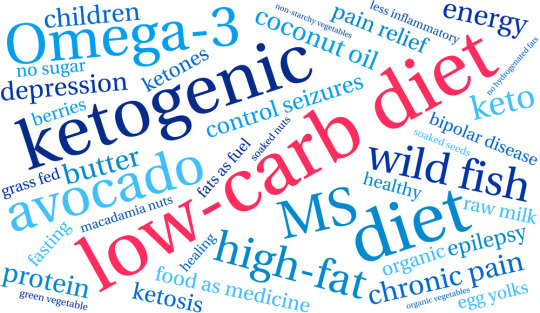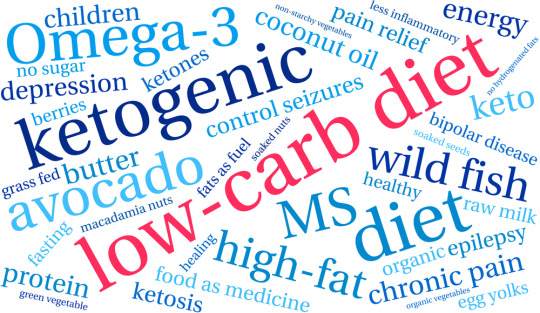#KetoDietRisks
Text
The Pros and Cons of the Keto Diet: Is It Right for You?

The Pros and Cons of the Keto Diet: Is It Right for You?
Are you thinking about starting a keto diet? Are you unsure about the pros and cons of this diet plan? In this article, we'll explore the keto diet, its benefits, drawbacks, and everything you need to know to decide whether it's the right diet plan for you.
Table of Contents
- What is the Keto Diet?
- How Does the Keto Diet Work?
- Pros of the Keto Diet
- Rapid Weight Loss
- Reduced Appetite
- Improved Blood Sugar Control
- Increased Energy Levels
What is the Keto Diet?
The ketogenic or keto diet is a low-carb, high-fat diet that aims to put your body in a state of ketosis. In this state, your body produces ketones from the breakdown of fats in the liver, which serves as an alternative fuel source for the body instead of glucose from carbohydrates.
The keto diet typically involves limiting your carbohydrate intake to 20-50 grams per day and increasing your fat intake to 70-80% of your daily calories. Protein intake is usually moderate at 10-20% of daily calories.
The keto diet has gained popularity as a weight loss and health improvement strategy, but it's important to weigh its pros and cons before deciding to start this diet plan.
How Does the Keto Diet Work?
When you restrict your carbohydrate intake, your body starts to deplete its glycogen stores, which are stored carbohydrates in the liver and muscles. Once your glycogen stores are depleted, your body turns to burning fats for energy, producing ketones in the liver.
Ketones can be used as fuel by most cells in the body, including the brain, which usually relies on glucose. The keto diet aims to keep your body in a state of ketosis, where it continuously burns fats for fuel, resulting in weight loss and other health benefits.
Pros of the Keto Diet
Rapid Weight Loss
One of the main reasons why people start the keto diet is for weight loss. By restricting carbohydrates and increasing fats, your body burns more fat for energy, resulting in faster weight loss compared to other diet plans.
Several studies have shown that the keto diet is effective for short-term weight loss, especially in people with obesity or excess body fat. However, long-term weight loss on the keto diet may vary, and it's important to sustain a healthy lifestyle to maintain weight loss.
Reduced Appetite
Another benefit of the keto diet is reduced appetite, which can lead to a lower calorie intake and further weight loss. Studies have shown that a low-carb, high-fat diet like the keto diet can decrease hunger and increase satiety, resulting in fewer calories consumed throughout the day.
Improved Blood Sugar Control
The keto diet may also improve blood sugar control in people with diabetes or prediabetes. By limiting carbohydrates, the keto diet reduces blood sugar spikes and insulin resistance, which can lead to better glucose control and lower insulin levels.
Increased Energy Levels
Since the keto diet relies on fats for energy instead of glucose, some people report increased energy levels and mental clarity while on the diet. However, this may vary between individuals, and some people may experience fatigue or brain fog during the initial stages of the diet.
Improved Mental Clarity
The keto diet may also improve mental clarity and cognitive function in some individuals. Ketones produced during ketosis have been shown to have neuroprotective effects and may improve brain function in people with neurological disorders like epilepsy or Alzheimer's disease.
Cons of the Keto Diet
Nutrient Deficiencies
The keto diet restricts several food groups, including fruits, grains, and some vegetables, which may lead to nutrient deficiencies if not properly planned. Nutrients like fiber, vitamins, and minerals are important for overall health and may need to be supplemented on the keto diet.
Keto Flu
The initial stages of the keto diet may cause symptoms like fatigue, headaches, and nausea, commonly known as the keto flu. This is due to the body's adaptation to using ketones for energy instead of glucose and usually lasts a few days to a week.
Difficulty Sustaining
The keto diet may be difficult to sustain for some people due to its strict dietary restrictions and limited food choices. It may also be challenging to follow when eating out or in social situations, which can make it challenging to sustain in the long term.
Increased Fat Intake
The keto diet requires a high intake of fats, which may not be suitable for everyone, especially those with a history of heart disease or high cholesterol. It's important to choose healthy fats like avocados, nuts, and seeds and limit saturated and trans fats to minimize the risk of heart disease.
Difficulty with Exercise
The keto diet may also affect exercise performance, especially high-intensity exercise that relies on glucose as fuel. It may take some time for the body to adapt to using ketones for energy, and some people may experience a decrease in performance during the initial stages of the diet.
Is the Keto Diet Right for You?
The keto diet may be beneficial for weight loss, blood sugar control, and improving overall health in some individuals. However, it's important to consider the potential risks and cons of the diet before starting.
If you're interested in trying the keto diet, it's essential to speak with a healthcare professional or registered dietitian to ensure that it's safe for you. They can also help you create a well-planned and nutritionally balanced keto diet that meets your individual needs and goals.
Conclusion
The keto diet is a popular weight loss and health improvement strategy that has its pros and cons. While it may be effective for short-term weight loss and improving blood sugar control, it may also lead to nutrient deficiencies, the keto flu, and difficulty sustaining in the long term.
If you're considering the keto diet, it's essential to weigh its benefits and risks and speak with a healthcare professional before starting. A well-planned and nutritionally balanced keto diet can help you achieve your health goals safely and effectively.
https://quickweightloss1.com/lose-weight-in-just-7-days-with-this-simple-diet-plan/
FAQs
- Can I still eat fruits on the keto diet?
- The keto diet restricts fruits that are high in carbohydrates, but low-carb fruits like berries can be incorporated in moderation.
- Is the keto diet safe for people with heart disease?
- The keto diet may not be suitable for people with a history of heart disease or high cholesterol. It's essential to speak with a healthcare professional before starting the diet.
- Can the keto diet cure diabetes?
- The keto diet may help improve blood sugar control in people with diabetes or prediabetes, but it's not a cure for diabetes.
- How long does it take to enter ketosis on the keto diet?
- It may take 2-7 days of restricting carbohydrates to enter ketosis, but this may vary between individuals.
- Can I still eat dairy on the keto diet?
- Yes, dairy products like cheese and butter are high in fat and can be included in moderation on the keto diet.
Read the full article
#atkinsvsketo#differencebetweenketoandatkins#f1keto#femalenotlosingweightketo#howlongisitsafetobeinketosis#istheketodietsafe#keto1weekresults#ketoadvancedweightloss#ketobenefits#Ketodietbenefits#ketodietplanforweightloss#Ketodietresults#ketodietresults8weeks#ketodietrisks#ketodietvslowcarbdiet#ketodietweightloss#ketoresults#ketotransformation#ketoweightlossfirstweek#lifestyleketoketogenicweightloss#lifestyleketoweightloss#lowcarbdietresultsafter1month#lowcarbdietvsketo#lowcarbvsketo#nocarbsfor3daysweightloss#notlosingweightonketo#trimlifeketo
0 notes
Text
bit.ly/2GYce8Z, Keto Diet Explained, Keto Diet Pills

bit.ly/2GYce8Z, Keto Diet Vegetarian in Idaho, Keto Diet Vegetables in Idaho, Keto Diet Vs Atkins in Idaho, Keto Diet Vs Intermittent Fasting in Idaho, Keto Diet Vegan in Idaho, Keto Diet Vs Paleo in Idaho, Keto Diet Video in Idaho, Keto Diet Veg in Idaho, Keto Diet Vitamins in Idaho, Keto Diet Vs Low Carb Diet in Idaho
#BillClintonDiet#WhatIsKetogenicEating#KetogenicDietWhatNotToEat#KetoRules#WhyKetoDiet#KetoDietStages#WhatFruitCanYouEatOnKeto#BenefitsOfKetoDiet#ProblemsWithKetoDiet#WeightLossInKetoDiet#KetoDietRisks#BestVegetablesToEatOnKetoDiet#KetogenesisVsKetosis#AreKetoDietsHealthy#HighFatFoodsForKetoDiet#KetoDietWhatNotToEat#FatSourcesForKetoDiet#WhatToEatToGetIntoKetosis#WhatIsKetogenic
0 notes
Text
bit.ly/2GYce8Z, Keto Diet Explained, Keto Diet Pills

bit.ly/2GYce8Z, Keto Diet Guide in Alaska, Keto Diet Good Or Bad in Alaska, Keto Diet Gluten Free in Alaska, Keto Diet Grocery List in Alaska, Keto Diet Good For You in Alaska, Keto Diet Gout in Alaska, Keto Diet Green Beans in Alaska, Keto Diet Greek Yogurt in Alaska, Keto Diet Gallstones in Alaska, Keto Diet Grapes in Alaska
#BillClintonDiet#KetoDietStages#WhatIsKetogenicEating#WhyKetoDiet#WhatFruitCanYouEatOnKeto#BenefitsOfKetoDiet#ProblemsWithKetoDiet#WeightLossInKetoDiet#KetogenicDietWhatNotToEat#KetoRules#BestVegetablesToEatOnKetoDiet#KetogenesisVsKetosis#KetoDietRisks#AreKetoDietsHealthy#HighFatFoodsForKetoDiet#KetoDietWhatNotToEat#FatSourcesForKetoDiet#WhatToEatToGetIntoKetosis#WhatIsKetogenic
0 notes